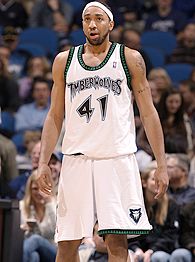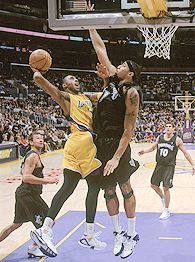Griffin's tragic life a story of talent and temptation
 By J.A. Adande
ESPN.com
Updated: August 22, 2007
By J.A. Adande
ESPN.com
Updated: August 22, 2007
These are various thoughts and observations, prompted by a tragic story.
This is coming from a distance, words about a person I don't know well, about a death whose precise circumstances we don't yet know for sure.
Was
Eddie Griffin trying to kill himself when he drove his SUV past railroad gates and flashing lights and into the side of a moving freight train in Houston last week? It will likely be some time before an investigation is complete, just as it took more than four days to identify Griffin because his body was burned so badly in the fiery crash that dental records were required for identification.
 David Sherman/NBAE via Getty Images
Griffin had dominant physical skills, but other aspects of the NBA life came harder.
David Sherman/NBAE via Getty Images
Griffin had dominant physical skills, but other aspects of the NBA life came harder.
But what we do know of Griffin is this: The stream of incidents, arrests and unsuccessful stints in rehabilitation centers allows us to list him as Exhibit A in the argument that just because you can enter the NBA, that doesn't mean you should.
An ex-player I talked to Tuesday called Griffin "a perfect example of a kid who shouldn't have went to the NBA early."
I saw the other extreme over the weekend in Las Vegas, where young men with zero or one year of college experience such as
LeBron James,
Dwight Howard and
Kevin Durant were gathered for the Team USA training camp. These are people who have stayed out of trouble, who seem capable of handling the extreme world of the NBA. Griffin's failures should not be a reason to deny opportunities for those who are ready.
But they should serve as a warning, a reminder that the most important part of college isn't the course credits, it's the socialization. It's about making the transition to adulthood in a sheltered environment where the mistakes aren't as costly as in the real world.
It's clear Griffin never learned to be responsible or accountable during his one year at Seton Hall or the six seasons he spent in the NBA. Maybe his problems were too serious for anyone in the league to deal with, even if teams' top priorities hadn't been making money and winning games. Regardless, it was the wrong environment for someone so unstable -- youth and money and loads of unsupervised time were a toxic combination for him.
Griffin also is a case study in the temptation of talent.
Because of a fight with a teammate, he had to finish high school by studying at home instead of going to class and walking across a stage to get his diploma. In his year at Seton Hall, he punched out a teammate in the locker room.
 Andrew D. Bernstein/NBAE via Getty
Griffin's defensive specialty was the blocked shot, as even stars such as Kobe Bryant learned.
Andrew D. Bernstein/NBAE via Getty
Griffin's defensive specialty was the blocked shot, as even stars such as Kobe Bryant learned.
And yet the Rockets traded the rights to their three first-round draft picks (
Jason Collins,
Richard Jefferson and
Brandon Armstrong) to get Griffin's draft rights in 2001.
While in Houston, Griffin pleaded guilty in an assault case, and yet the Nets and then the
Minnesota Timberwolves signed him to free-agent contracts. He later was jailed for violating probation, and yet the Timberwolves re-signed him, this time to a three-year, $8.1 million extension. They wound up cutting him loose in March.
Before his self-destructive tendencies turned deadly, they were expensive. Before he cost those who loved him the chance to see him again, he cost teams money, players and time. But who's to blame for that?
There's a blinding arrogance teams get when they covet talent. They think they can make it work for them, when all the evidence suggests otherwise.
I can't believe some of the strange and sad phrases associated with Griffin that came out while doing some research on him. These old news stories
here and
here (which I found through a Minnesota-based web site called MNspeak.com) contained the unusual charge of "deadly conduct" and a probation violation for "consorting with disreputable people."
In March of 2004 Griffin plea-bargained to a misdemeanor charge of deadly conduct after facing a felony charge of aggravated assault that stemmed from an accusation that he punched and shot at a woman who came across Griffin with another woman in his Houston house. That prompts two questions: (1) How can something as serious-sounding as "deadly conduct" only be a misdemeanor? (2) In retrospect, wasn't his adult life an extended episode of deadly conduct, one practically destined for an early fatality?
The deadly conduct guilty plea resulted in an 18-month probation. While serving it, Griffin was sentenced to 15 days in jail because he was at a Houston nightclub when a fight broke out.
A court official said Griffin violated probation because he was "consorting with disreputable people." I wonder how many people would be better off if we consistently made that a jailable offense, if we forced them to choose between the company they keep and their best interests.
We've seen how
Michael Vick was unable to escape his crowd and its dogfighting culture. While Griffin, apparently, was not surrounded by people who could guide him to the right path, in the end he wasn't able to escape himself.
The
2001 draft is starting to resemble the cursed
class of 1986 when it comes to tragedy and disappointment.
Griffin's death follows the failure of No. 1 overall pick
Kwame Brown in Washington, the unrealized potential of
Tyson Chandler and the bad behavior of
Zach Randolph that caused the Trail Blazers to dump a 20-and-10 guy for a player they didn't even want to keep.
Likewise, the 1986 draft was overshadowed by the cocaine-overdose death of Len Bias, and drug-wasted careers of Chris Washburn and Roy Tarpley, plus the injury-shortened career of top pick Brad Daugherty.
One of my first reactions to the sad news was that I never really got to know Eddie Griffin. Later I realized that's because he never played in the playoffs. The playoffs are when casual fans get to know players' names and faces, and when we in the media get to know out-of-town players' personalities. You spend a week or two with a team over the course of a series and you get a little sense for who they are. But he never played in May, a sad reflection on his career and the teams that acquired him.
If most sports fans remember him at all, it's probably because last year he was in a car crash that witnesses said occurred because he was driving while watching a porno DVD and masturbating. That was good for a few yuks around the blogosphere. But maybe we should have taken it more seriously, recognizing it for what it was, a sign of his descent.
It was a warning that went ignored, just as, surely, some other unprepared teenager will someday fail to pay attention to the lessons of Eddie Griffin, and some team will take that risk.
Link
Very sad.
RIP Eddie.